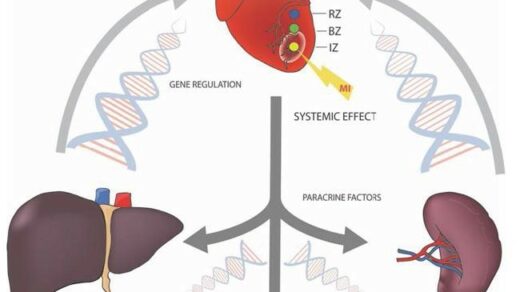Read short summaries of the latest oncology-focused research published in this week’s issue of Oncotarget, Volume 12, Issue 16.

Oncotarget’s Volume 12, Issue #16
New Publications
Cover (Research Paper): Epigenetic signatures differentiate uterine and soft tissue leiomyosarcoma
Origin: Connecticut, United States
Institution: Yale University
Quote: “Leiomyosarcomas (LMS) are diverse, rare, and aggressive mesenchymal soft tissue sarcomas. Epigenetic alterations influence multiple aspects of cancer, however epigenetic profiling of LMS has been limited. The goal of this study was to delineate the molecular landscape of LMS for subtype-specific differences (uterine LMS (ULMS) vs soft tissue LMS (STLMS)) based on integrated analysis of DNA methylation and gene expression to identify potential targets for therapeutic intervention and diagnosis.”
Research Paper: High CD39 expression is associated with the non-muscle-invasive phenotype of human bladder cancer
Origin: São Paulo, Brazil
Institutions: Universidade Nove de Julho, University of São Paulo Medical School, Hospital da Saúde do Homem
Quote: “This study aimed to evaluate CD39 and CD73 expression in a cohort of patients with non-muscle-invasive (NMI) and muscle-invasive (MI) BC [breast cancer] regard to its association with clinicopathological features.”
Research Paper: MiR-7-5p inhibits thyroid cell proliferation by targeting the EGFR/MAPK and IRS2/PI3K signaling pathways
Origins: Brussels, Belgium; Pierre Benite Cedex, France
Institutions: Université libre de Bruxelles, Université Lyon 1, J. Bordet Institute
Quote: “The aberrant expression of miRNAs is often correlated to tumor development. MiR-7-5p is a recently discovered downregulated miRNA in thyroid papillary carcinoma (PTC). The goal of this project was to characterize its functional role in thyroid tumorigenesis and to identify the targeted modulated pathways.”
Review: Genetic testing for homologous recombination repair (HRR) in metastatic castration-resistant prostate cancer (mCRPC): challenges and solutions
Origin: New South Wales, Australia; Delhi, India; Rio Grande do Sul, Brazil; St. Petersburg, Russia; Singapore; Giza, Egypt
Institutions: Hunter Medical Research Institute, Rajiv Gandhi Cancer Institute, Universidade Federal do Rio Grande do Sul, Ministry Healthcare of the Russian Federation, National Cancer Centre Singapore, Cairo University
Quote: “This review provides insights into the HRR [homologous recombination repair] gene mutations prevalent in mCRPC [metastatic castration-resistant prostate cancer] and the challenges for a more widespread gene testing to identify actionable germline pathogenic variants and somatic mutations in the HRR pathway, and proposes a clinical algorithm to enhance the efficiency of the gene testing process.”
Review: Interactions of multidomain pro-apoptotic and anti-apoptotic proteins in cancer cell death
Origin: Doornfontein, South Africa
Institution: University of Johannesburg
Quote: “This review aims at highlighting the association between pro-apoptotic and anti-apoptotic proteins, and their significance in cancer therapy.”
Editorial: Mechanisms of resistance to mitochondria-targeted therapy in pancreatic cancer
Origin: Prague-West, Czech Republic
Institutions: Czech Academy of Sciences, Czech Science Foundation
Quote: “Pancreatic cancer remains a major unsolved health problem as a result of limited success rate of chemo- or radiation therapy. New treatment strategies are urgently needed to improve the survival rate of patients with this
type of malignancy.”
Editorial: Glucose starvation induces NADPH collapse and disulfide stress in SLC7A11high cancer cells
Origin: Texas, United States
Institution: The University of Texas MD Anderson Cancer Center
Quote: “Glucose starvation induces rapid cell death in some cancer cell lines whereas other cancer cell lines are resistant to glucose deprivation. However, the genetic determinants underlying differential sensitivities to glucose starvation–induced cell death in cancer cells remain incompletely understood.”
Editorial: Tumor-reactive T cells are licensed by dendritic cells located in spatially different tissues: implications for dendritic cell vaccines
Origin: Tel-Aviv, Israel
Institution: Tel-Aviv University
Quote: “Since the discovery of dendritic cells (DC), exploiting their unique ability to activate CD4+ and CD8+ T cells against cancer cells has held great promise [1, 2]. Nonetheless, despite countless attempts [3], DC-based vaccines have not yet lived up to expectations [4], beyond preventing tumor growth in prophylactic or adjuvant tumor settings [5, 6] and anecdotal success [7]. It remains unclear why the activation of DC, which are so prominent in activating tumor-reactive T cells, does not lead to eradication of established solid tumors.”
Click here to read Oncotarget’s Volume 12, Issue #16.
YOU MAY ALSO LIKE: More Oncotarget Videos on LabTube
—
Oncotarget is a unique platform designed to house scientific studies in a journal format that is available for anyone to read—without a paywall making access more difficult. This means information that has the potential to benefit our societies from the inside out can be shared with friends, neighbors, colleagues, and other researchers, far and wide.
For media inquiries, please contact media@impactjournals.com.




